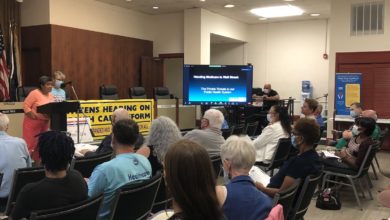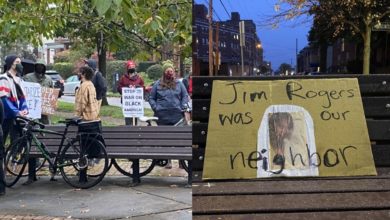Pennsylvania, a so-called “swing state,” is quickly becoming a testing ground to introduce new undemocratic legislation and measure its feasibility. Rushed through the state legislature in July just days after the Dobbs decision, very quietly in a special voting session convened after 11 p.m., Pennsylvania Senate Bill 106 proposes to amend the state constitution to declare it does not provide any protections of the right to an abortion. In many states, the judiciary has been the last line of defense against regressive abortion bans passed by state legislatures. This amendment, if passed, would strip the state judiciary of any ability to block attacks on abortion. Despite the constitutional amendment on abortion being the most discussed and the subject of the most public education so far, there are also four other constitutional amendments included in SB 106, all of which constitute attacks on the basic democratic rights of the people of Pennsylvania.
As Black and Latino votes, and swelling urban centers pose an ever growing demographic barrier to an unpopular far-right, pro-capitalist agenda, the conservative solution is to double down on the suppression of democratic rights including voter suppression and access to abortion. Many of these attacks on democratic rights will grant state legislatures sweeping new powers while simultaneously taking powers away from both the state executive and judicial branches. The rightwing has had a long-term strategic focus on state legislatures, and they control the majority of state legislatures.
In Pennsylvania, SB 106 represents a central component of this attack.
SB 106 proposes to amend Pennsylvania Constitution
Many Pennsylvanians recognize SB 106 as a dangerous bill that could greatly restrict abortion protections across the state. Less widely known are the multifaceted attacks on voting rights also introduced by SB 106. Legislators hope to use abortion as a wedge issue to drum up support or confuse Pennsylvanians on the true impacts of this package. Below are some of the amendments SB 106 proposes.
One of the proposed amendments would drastically change the oversight of elections in Pennsylvania. Proposed Amendment 5 would grant election audit privileges strictly to the Auditor General. Pennsylvania already has a system in place to audit elections. Multiple counties in the state have refused to certify recent elections despite court orders and guidance from the governor. This amendment would take away the existing audit process, involving all of the state judicial, executive and legislative branches. Instead, one person, the Auditor General, would oversee this process. Additionally, the proposed amendment would require the state legislature to appoint an independent auditor in years when the Auditor General stands for re-election, or every four years. This would in practice mean the legislature would be able to audit their own elections at least every four years.
Another amendment, proposed Amendment 2, would give the Pennsylvania legislature the power to override restrictions and state of emergencies declared by the governor. This measure was introduced in direct response to Governor Wolf declaring a state of emergency to fight COVID. This would greatly reduce the ability of the state government to address public health emergencies or natural disasters.
Amendment 3 would introduce new, stricter voter ID laws and other voting restrictions. Voter ID laws disproportionately affect the most marginalized people in our communities. People of color and low income Pennsylvanians are the groups least likely to have current, valid voter IDs. These laws are also a dangerous cover for voter suppression and introduce new barriers for citizens to exercising their democratic rights. Voters would have to jump through more and more hoops just to exercise a basic right that should be guaranteed to all.
SB 106 has already passed in the state legislature once. It must pass in two consecutive sessions before being put to public referendum. The incoming legislature that will be elected this November will go in session January 2023, meaning they could vote a second time on SB 106 in January and each of the proposed amendments could go to a public referendum as early as May 2023.
The strategy of empowering state legislatures comes before the Supreme Court is set to decide the Moore v. Harper case in the summer of 2023. This case from North Carolina decides the future of gerrymandering and could set a serious precedent for the way elections are decided. Right-wing state legislators are organizing for the case in which the Supreme Court rules in favor of Moore v. Harper, which would uphold independent state legislature theory. This precedent would empower state legislatures to decide the outcomes of elections, uphold their ability to gerrymander, and in the most extreme case, allow state legislatures to overturn federal election results decided by popular vote. The far right is clearly playing with fire here. The proposed constitutional amendments encapsulated in SB 106 would position the Pennsylvania state legislature to take a disproportionately strong role in determining the outcome of future elections if Moore v. Harper is upheld.
The constitutional strategy
Proposing amendments to the state constitution is a convenient way for legislators to bypass existing checks and balances in the government to change the laws in their states. The governor cannot veto a proposed constitutional amendment, and if passed, constitutional amendments serve as precedent for how the judiciary must rule on cases. A slate of other similar constitutional amendments have been recently introduced in states across the country.
One example is Kentucky. Two amendments are on the table for a public referendum this November. The much-publicized Amendment 2 includes extremely similar language to that proposed by SB 106 and would revise the Kentucky constitution to explicitly state it does not protect the right to an abortion. Amendment 2 has been the subject of a massive mobilization of people fighting back against the passage of a constitutional amendment that takes away the basic right of a woman to control her own body. The Kentucky legislature has used this moment of huge public focus on abortion to quietly push forward Amendment 1, which would allow the Kentucky legislature to hold special sessions that would be able to override decisions made by the governor. This would cause a huge shift in the balance of power away from the governor to the strongly right-wing controlled legislature.
In West Virginia, four constitutional amendments will be on the ballot in the November election. One of these, Amendment 1, stipulates that “courts [will] have no authority or jurisdiction … to intervene or interfere with impeachment proceedings” and that “a judgment rendered by the Senate following an impeachment trial [will not be] reviewable by any court of this state.” This language, if added to the state constitution, would allow the state legislature to arbitrarily draw up articles of impeachment on dubious grounds against any state legislator or judge with absolute impunity. The other three constitutional amendments proposed in West Virginia grant the legislature expanded control over the educational system and the levying taxes. Like in Kentucky, these constitutional amendments have gone largely unnoticed after state legislators passed the most restrictive abortion ban since the overturning of Roe in September.
Supreme Court case challenges electoral oversight
A recent U.S. Supreme Court case regarding electoral certification in Pennsylvania provides some insight into how the court will decide on future attacks on voting rights across the United States.
Almost a year after the November 2021 election, three counties in Pennsylvania still have not certified the results of the elections. The lawmakers in these counties have cited a technicality on the way mail-in ballots were dated as a reason to invalidate those votes. In those counties, the mail-in ballots were the determining factor in the outcomes of multiple races.
Multiple courts, up through the 3rd U.S. Circuit Court of Appeals, ruled that the lack of a date on an inner envelope of a mail-in ballot was not grounds to not include the ballot in an official vote count. The U.S. Circuit Court of Appeals case began to be cited by other courts as precedent for including ballots that were missing minor technical details. On Oct. 11, the U.S. Supreme Court ruled the lower court decision moot. This means the election results from November 2021 were not invalidated, but that in future elections, ballots may not be counted due to minor technicalities. The rightwing in Pennsylvania is also simultaneously attacking ballot curing, or the practice of sending mislabeled ballots back to voters for correction. These developments come only weeks before a major and potentially hotly contested election in November.
People’s movement the only way to fight back!
The Supreme Court’s decision to take electoral oversight away from the Pennsylvania judiciary and give it to legislators could foreshadow how the Supreme Court may rule on Moore v. Harper. The Supreme Court, an arch-reactionary, anti-democratic institution made up of appointed representatives of the ruling class, may be poised to take away basic democratic rights the people of the United State have fought for. It’s clear that existing institutions of the U.S. government will not suddenly decide to give those democratic rights back.
The people must fight back for an expansion of democracy, not a reduction in basic democratic rights. While right-wing legislators pass bills restricting the ability of the working class of the United States to have a say in their own government, the Democratic Party mounts no serious fight back. Instead, they see increasingly right-wing legislators as a fundraising opportunity and a chance to position themselves yet again as the “lesser of two evils.”
Only through masses of people organizing and taking to the streets have any reforms been won under capitalism. A militant movement of women fighting for the right to abortion drove forward the 1973 Roe v Wade decision. So too did millions politically active in the civil rights movement win expanded democratic rights for people of all races through the Civil Rights Act of 1964 and the Voting Rights Act of 1965. It’s been done before and it can be done again. A mass people’s movement can roll back a full-out assault on basic rights.
To join the fight against SB 106 and rollbacks on democratic rights in Pennsylvania, visit pa4abortion.org to sign the petition and sign up to volunteer.






